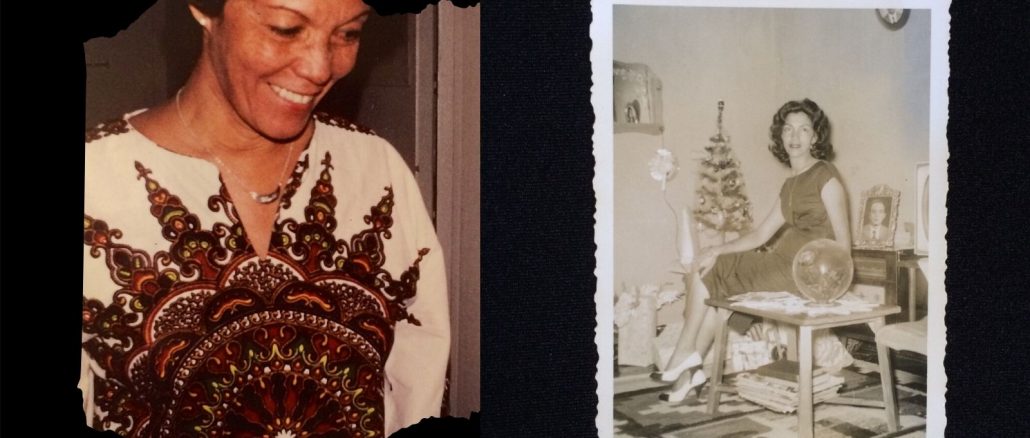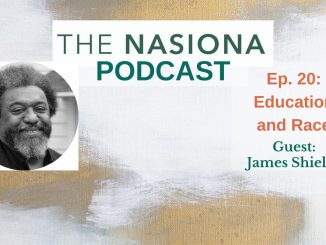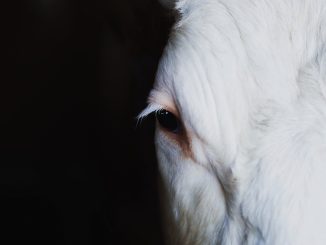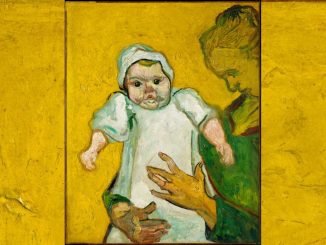

My grandmother sits on her bed, gazing out the window. She is calm, quiet, and patiently awaiting instructions. The camera is in place as I make a few more adjustments before the shot is perfect. Her teal sweater underneath her classic purple floral shirt hasn’t changed in decades. I’ve never interviewed my grandmother before, let alone anyone in my family. Our matriarch sits regally on her throne.
“Okay,” I say. “¿Estas lista Abue?” (Abue is what my sisters and I have called her since we were kids. A half-bitten version of abuela.) “Si, estoy lista para mi close up,” she says and smiles. Her hair is dyed brown with just a few grays left in to remind you of her years of wisdom. Her wrinkles lay gently on her face, hugging weathered eyes that always seem to smile, too.
Earlier that year, my 81-year-old grandmother married for the second time to Donald, a 78-year-old bachelor. Don is an Ohio native who doesn’t know more than “hola,” matched by my grandmothers English, which was just as limited. The whole family grew giddy at the news. How did this happen? How do they communicate? Also … how cute.
I came to Fort Myers, Florida, to learn more about my grandmother’s newlywed life. It was a mystery and I wanted to see it for myself. This quirky story was hailed as an inspiration by my friends and family. My grandma and Don agreed to let me film my week with them, something to share with everyone in the years to come.
While waiting outside the airport terminal, the reality that I’ll be in a senior citizen apartment building for a whole week sets in. An old, brown Lincoln Town Car pulls up and I see my grandmother in the passenger seat looking for me. Beside her is Don with oversized glasses and a US military cap on, hunched over the wheel, pained by the adventure to come.
Her eyes perk up at the sight of me as I come over and kiss her on the cheek. Don follows and welcomes me to Florida, “Well Danny, I would carry your bags to the trunk but, ah, you are young and strong, so you can do it,” he says earnestly.
Their apartment was filled with little figurines from my childhood: miniature Peruvian flags, llama statues, pictures of Machu Picchu, even my grandmother’s apron on the oven handle displayed in all its stained glory. But now, beside each relic sits something unfamiliar: a busk of JFK and Abraham Lincoln, a large blanket with John Wayne’s face embroidered on it, and Cleveland Cavalier memorabilia. A hyphenated coexistence.
“Wow Abue, that’s a big John Wayne blanket,” I say.
“Yes, Don. Loves him. John was a good man who loved Jesus,” she says.
Born in Lima, Peru, my grandmother was the oldest of two siblings. A daddy’s girl with a love of classical music who wanted to be a nurse, but instead by 22 became a wife and, quickly after, a mom. By 27, she was left with five children while my grandfather worked from city to city in the Amazon, gone for months at a time. My mother often told me of a hardened woman who grew bitter and tough by her loneliness and his deception. She would often snap at the smallest things, something my mom promised to never be.
In the ‘80s, my grandmother would come to the United States often to meet her grandkids, but one day my father asked her to stay, and she agreed. While my parents worked, she would cook, clean, and change us. At the school’s cafeteria I sat drooling at the sight of the latest sweets and chips seen in commercials or on the back of cereal boxes. My friends at school ate peanut butter and jelly sandwiches and I had cau cau, a turmeric-stained tripe stew with potatoes and peas over rice.
“Eww!” they would say. “What is that?”
“It’s cow stomach!” I’d declare, as I took each exaggerated bite with smile. I loved making them squirm.
“Did you ever think you’d get married again?” I ask.
“Oh! Nunca! Never!” she says. “Danny, I was happy with my Salvation Army, my Bible, my friends. I have been alone for a long time. But then Don came and just never left me alone,” she says.
Don lived in the apartment directly above hers. He would periodically come down and ask her how her day was and if she needed any help, looking for an excuse to talk to her.
“Well Danny, I was a bachelor my whole life,” he says. “I never wanted to get married. Didn’t think it was for me. But when I met your grandmother, well I really fell for her. She is a sweet and strong woman.”
He would help her run errands, practice the pledge of allegiance for her citizenship test, and take her to dinner at his favorite restaurant, Roy Rogers. They had a great senior citizen special, he said. At the year’s end, he dropped her off at the airport for the holidays. She was going to California for a few weeks to visit us. This time he did something different, he told her he would miss her and kissed her on the cheek. A true gentleman.
That Christmas we knew something was up when my grandmother was glued to her cell phone, “I miss you too!” she would say over and over. What a sight to see; a love struck 80-year-old woman acting like a teenager again.
“What about language, is it hard?” I ask.
“Sometimes,” my grandmother answers. “He helps me practice my English, but I learned how to speak Spanglish.”
“I don’t know any Spanish,” he says. “‘Hola’ and ‘gracias’ and that’s about it, Danny!”
After a few days at their house, I had a suspicion Don knew a little more than he realized. That, or the power of body language was in full effect. My grandmother would often start in broken English but switch over to Spanish by mistake. But Don, would respond perfectly, as if she didn’t change over at all.
“I want ketchup Bertha!” he exclaims.
“I want ketchup por favor,” she responds.
“Ketchup please,” he says.
Every day after our interviews, Abue and I would flip through old family photos, many I hadn’t seen since she lived with us. As a child, I use go through them one by one and paint a picture in my head of what my mom and her four brothers did that day. A day at the beach building sandcastles, a day at the park eating ice cream, a day at church in their Sunday best, bored. But always beside them, my stoic grandmother standing tall with long wavy hair pinned to the side like a 1950s catalog. Her face serious and her body statuesque.
Are you happy you moved to the United States?
“Yes. The opportunity was better for you and your sisters and I wanted to be closer to my daughter,” she says. “I learned you have to be open to new life experiences. Life’s too short. Especially for an oldie like me. Don’t get too comfortable! Sometimes people don’t understand me but that’s okay. I’m different and so are they. We all are.”
When I hear Donald Trump’s policies regarding immigrants today, I think of Abue. He threatens family-based sponsorship, birthright citizenship, and wants to create a new points-based immigration system that would favor the wealthy.
If he were to succeed, would stories like my grandmother exist? Will our colors begin to change? And will we lose the spark that makes the United States different?
I turn off the camera and start to pack up while my grandmother goes to the kitchen to prepare dinner. I sit on her bed and gaze out the same window. My heart felt too full, it needed to burst. I had heard her life from beginning and end, and although I was so happy, time felt so fragile. History is on a timeline and we all make up a single slice, just one slice for each of us.
COLUMNIST
Danny Deza is a freelance writer and producer based in Los Angeles. He has had works published in Narratively, Al-Monitor, The Boston Globe, Travel + Leisure, among others. He has also produced TV shows for ABC News, History Channel, Turner Broadcasting, and The Food Network. Danny writes about LGBTQ issues, immigration, the Latinx diaspora, and human-interest stories.
Twitter: @Danny_Deza



